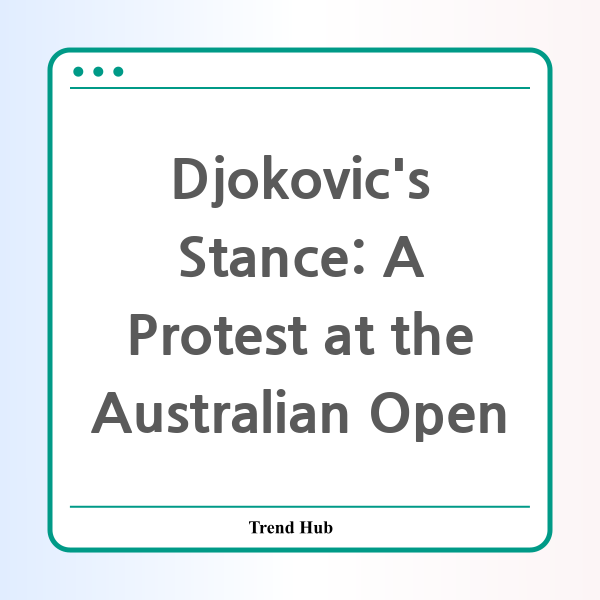* This website participates in the Amazon Affiliate Program and earns from qualifying purchases.

Have you ever witnessed a champion standing up for their beliefs on the grandest stages of sports? Novak Djokovic recently made headlines during the Australian Open, but not for his remarkable athletic prowess. Instead, he sparked a significant conversation about respect and media relations when he decided to forgo the traditional post-match interview.
Djokovic's decision to skip the interview was fueled by comments made during a live broadcast by a presenter at Channel 9, the official broadcaster of the tournament. The remarks were perceived as disrespectful and derogatory towards Djokovic and his fans. The presenter referred to Djokovic as "overrated" and a "has-been," comments that caused an uproar among Djokovic's supporters and the tennis community at large. The Serbian superstar, who has won 24 Grand Slam titles, expressed his disappointment, stating that he felt the comments made a mockery of his dedicated fans.
In a statement after his victory, Djokovic revealed that his protest was not directed towards the crowd or his fellow competitors, but squarely aimed at the broadcaster and the specific journalist responsible for the remarks. He noted his willingness to face any repercussions for his actions, including potential fines, emphasizing the importance of standing up for one’s dignity.
Djokovic later took to social media to articulate his reasons, stating that his decision to boycott interviews was in response to the lack of a public apology from the broadcaster. This incident sheds light on the balance of power in the media landscape, where athletes often find themselves at the mercy of public opinion crafted by broadcasters.
The aftermath of Djokovic's actions led to an apology from the presenter involved, who acknowledged that his comments were perceived as insulting and admitted he misjudged the situation. He clarified that he intended to engage in light-hearted banter but understood the gravity of his mistake, especially in a sporting environment where emotions run high.
This incident raises a broader question about the relationship between athletes and the media. Is it fair for media personalities to make derogatory statements about athletes, especially when they are performing at such high levels? The media holds significant influence over public perception; therefore, it is crucial for journalists to approach their work with respect and mindfulness of the athletes they cover.
Looking ahead, Djokovic's next match against rising star Carlos Alcaraz will be more than just a contest of skills; it is a clash of generations, a symbol of the transition in men's tennis. Djokovic holds a slim lead in their head-to-head matchups, yet the stakes have been raised. Alcaraz, the 21-year-old prodigy, has proven to be a formidable opponent, adding another layer of intrigue to this highly anticipated encounter.
The upcoming quarterfinal bout will not only spotlight their tennis skills but will also serve as a stage for Djokovic to reaffirm his legacy against the new wave of talent. As fans, we are privy to a captivating narrative unfolding at the Australian Open: one where respect for the players and their supporters reigns supreme. In a sport defined by both individual triumph and national pride, Djokovic's stand serves as a reminder of the responsibilities that come with fame and influence in the world of sports.
As the tournament progresses, all eyes will be on Djokovic—not just for his athletic prowess but for his ongoing dialogue with the media and the implications that follow. In a world where words matter, Djokovic's protest is a powerful statement about honoring the spirit of the game and those who support it. Here’s hoping that this incident leads to a more respectful discourse between athletes and the media in the future.
* This website participates in the Amazon Affiliate Program and earns from qualifying purchases.